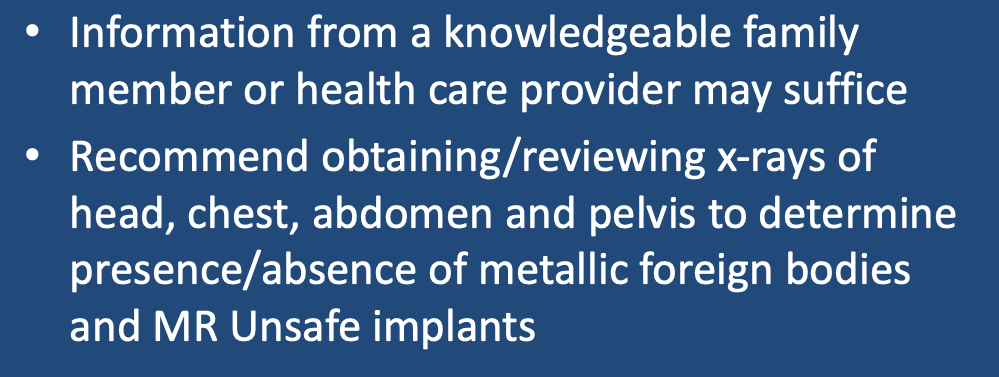Occasionally, an urgent MRI must be performed in a patient who cannot complete the regular screening form due to neurologic problems or simply lack of knowledge about prior medical procedures. In this situation a knowledgeable family member or caretaker may be allowed to complete the screening form on behalf of the patient. Healthcare providers knowledgable of the patient’s medical history may also be allowed to complete the screening form in conjunction with review of the medical record. However, if sufficient history is not available, the following steps are suggested:
- The attending radiologist should issue approval for MRI (if warranted) after reviewing from the medical record the rationale for medical necessity documented by the healthcare provider requesting the study.
- Contemporaneous imaging studies of the head, chest, abdomen and pelvis should be reviewed to determine the presence of potentially MR Unsafe implants or metal/shrapnel in critical anatomic locations like the eye. If these are not available then an AP chest x-ray and KUB should be obtained, as well a lateral x-ray of the skull. Additional x-rays or CT scans may be needed to clarify initial x-ray findings.
- Gadolinium contrast should be avoided (if possible) if allergy history cannot be obtained. If contrast is required then renal function should be assessed by measurement of eGFR.
Advanced Discussion (show/hide)»
No supplementary material yet. Check back soon!
References
ACR Committee on MR Safety. ACR Manual on MR Safety. American College of Radiology, 2024. [Direct Link]
ACR Committee on MR Safety. ACR Manual on MR Safety. American College of Radiology, 2024. [Direct Link]
Related Questions
How do you screen patients for implants and foreign bodies prior to MRI?
How do you screen patients for implants and foreign bodies prior to MRI?
